Finding a Veterans Rehab Center: Get Treatment and Support
Get Addiction Treatment Help Covered as a Veteran
Veterans rehab centers offer specialized treatment programs for veterans facing substance abuse and mental health challenges. These veterans rehab centers address issues like PTSD, chronic pain, and addiction, providing tailored support to help veterans take the first step toward recovery.
In this latest resource from TriCareRehabs, we’ll explore the unique challenges veterans face, the comprehensive programs available at a veteran’s rehab center, and the importance of continuous support.
Key Takeaways
- Over 10% of veterans are diagnosed with substance use disorders, largely due to factors such as cultural norms around alcohol use and the prescription of opioids for pain management in conjunction with PTSD.
- Veteran rehab centers implement comprehensive treatment programs, including medical detoxification, individual and group therapy, and dual diagnosis treatment to address both substance abuse and co-occurring mental health issues.
- Post-treatment support is crucial for veterans transitioning to civilian life, providing counseling and resources to help maintain sobriety and navigate the challenges that accompany recovery.
Understanding the Unique Challenges Faced by Veterans
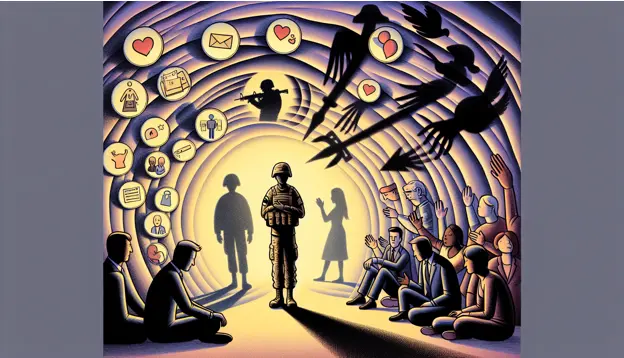
Military veterans often encounter unique challenges that set them apart from the general population. Over 10% of veterans are diagnosed with substance use disorders, a rate significantly higher than that of the general population. This disparity is partly due to cultural norms within the military that promote alcohol use for stress relief and socializing, which can lead to patterns of heavy drinking among veterans.
Additionally, many veterans are prescribed opioids for pain management, which increases their risk of developing substance use disorders, especially among those who also suffer from PTSD.
The traumatic events experienced during military service can lead to conditions such as post-traumatic stress disorder (PTSD) and survivor’s guilt, both of which contribute to the higher risk of substance abuse among veterans.
The Presence of Trauma and Importance of Dual Diagnosis Care
PTSD, often referred to as stress disorder PTSD, can manifest in various ways, including anxiety, depression, and difficulty adjusting to civilian life. These mental health issues, combined with the chronic pain from injuries sustained during service, create a complex web of challenges that many veterans struggle to navigate.
Recognizing and addressing the specific needs of veterans is vital for effective support. Programs designed to address these unique challenges are essential in helping veterans overcome their substance use disorders and achieve long-term recovery.
Comprehending the root causes of their struggles and providing tailored treatment options enhances support for veterans on their path to reclaiming their lives.
Comprehensive Treatment Programs for Veterans
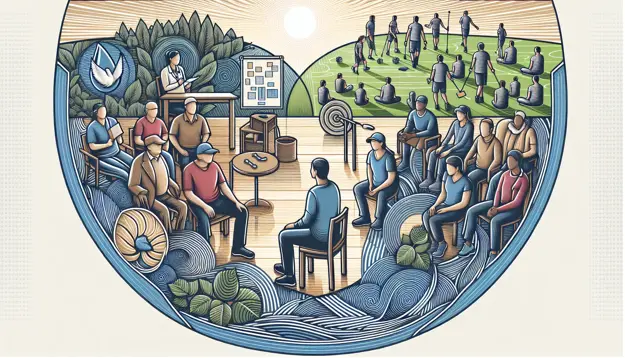
Veterans rehab centers offer a variety of comprehensive treatment programs designed to address the unique challenges faced by military veterans. These programs are tailored to meet the specific needs of veterans, including those who have experienced homelessness or have co-occurring mental health conditions.
The following sections detail key components of these treatment programs, including medical detoxification, individual and group therapy sessions, and dual diagnosis treatment.
Medical Detoxification
The addiction treatment process for veterans begins with medical detoxification. This process involves the safe and supervised withdrawal from substances, ensuring that veterans can begin their recovery journey without the physical burden of addiction.
Medically supervised detoxification programs are specifically designed to address the substance addiction challenges faced by veterans, providing a controlled environment where withdrawal symptoms can be carefully managed.
The safety of the veteran is paramount during this phase, with healthcare professionals closely monitoring the detox process to manage any complications that may arise. Such careful oversight ensures the veteran’s physical well-being and establishes a solid foundation for subsequent addiction treatment stages.
Addressing immediate physical dependencies through medical detoxification paves the way for more in-depth therapeutic interventions in addiction medicine.
Individual and Group Therapy Sessions
Therapy is a cornerstone of addiction treatment, providing veterans with the tools they need to manage their recovery. Individual therapy sessions focus on personalized coping strategies, enabling veterans to effectively handle their specific addiction triggers. This one-on-one approach ensures that the unique experiences and challenges of each veteran are addressed, fostering resilience and long-term recovery.
Group sessions complement individual therapy, playing a vital role in the treatment process. These sessions offer veterans the opportunity to connect with peers who have shared similar experiences, creating a supportive community that is essential for sustained recovery.
Group therapy fosters a sense of camaraderie and mutual understanding, which can be incredibly powerful for veterans as they navigate the complexities of addiction and recovery.
Dual Diagnosis Treatment
Many veterans face the dual challenges of substance abuse and mental health disorders, necessitating an integrated treatment approach. Dual-diagnosis treatment plans are specifically designed to address both addiction and mental health issues, as well as other mental health issues, offering a comprehensive care model that considers the entire well-being of the veteran.
This approach is particularly important for veterans who suffer from conditions like PTSD, depression, and anxiety.
Specialized accommodations and expert support are crucial in ensuring effective care for veterans with dual diagnoses. Integrating mental health and addiction therapies, these programs offer a holistic solution addressing the root causes of addictive behaviors and supporting long-term recovery. This dual focus is essential in helping veterans achieve a balanced and healthy life.
The Importance of Post-Treatment Support
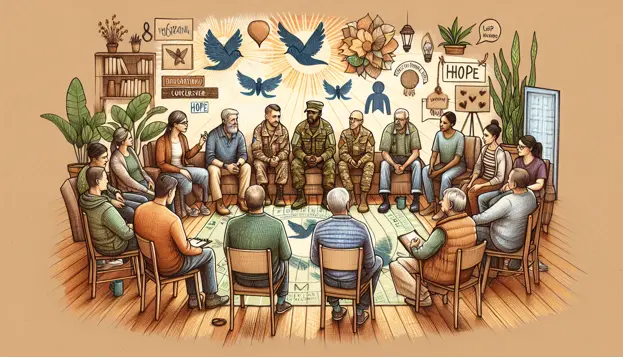
The path to lasting recovery does not end with the completion of a treatment program. For many veterans, the transition back to civilian life can be fraught with challenges, including finding employment and maintaining a stable routine. Post-treatment support services for veterans help vets navigate challenges and sustain their recovery.
Counseling and peer support play a significant role in this phase, providing veterans with the tools and resources they need to manage their recovery effectively. These support systems help veterans build resilience and develop coping strategies that are essential for long-term success.
The loss of routine and structure that often accompanies the transition from military to civilian life can contribute to feelings of unease and instability, making ongoing support even more critical.
Offering a range of post-treatment support services, such as short-term outpatient counseling and intensive outpatient treatment, aids veterans in maintaining sobriety and achieving recovery goals. These services contribute to the overall well-being of veterans, helping them build fulfilling lives post-treatment.
Accessibility and Inclusivity in Veteran Rehab Centers
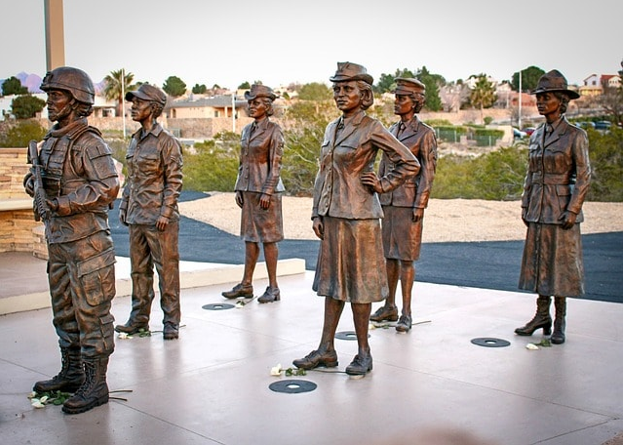
Accessibility and inclusivity are key considerations in the design and operation of veteran rehab centers. These facilities are equipped to accommodate veterans with a range of physical and mental health conditions, ensuring that all veterans can access the care they need. Layouts and equipment are designed to be physically accessible, catering to those with mobility challenges.
Veteran rehab centers prioritize inclusivity by offering tailored support for those managing addiction and mental health conditions. This includes specialized treatment centers that address the unique needs of each veteran, whether they are dealing with physical injuries or mental health issues.
The commitment to accessibility and inclusivity ensures that all veterans, regardless of their conditions, can receive the comprehensive care they deserve. By creating an environment that supports the diverse needs of veterans, rehab centers can more effectively assist them on their journey to recovery.
Insurance Coverage and VA Community Care Network
Insurance coverage is a vital aspect of accessing addiction treatment for veterans. The VA Community Care Network provides veterans with access to healthcare services that may not be available at VA facilities, ensuring they can receive the comprehensive treatment they need. This network is managed by third-party administrators, including Optum Serve and TriWest Healthcare Alliance, who facilitate access to a wide range of healthcare services.
Veterans can use their VA benefits to receive treatment for substance use disorders, making it easier for them to access the necessary care.
Additionally, many veterans seek treatment through TriCareRehabs, using TRICARE for Life to cover the costs of their rehabilitation.
This combination of VA benefits and third-party network services ensures that veterans have multiple avenues to obtain the support they need.
Understanding available insurance options and navigating the VA Community Care Network enables veterans to access necessary treatment services more easily. This support is crucial in helping veterans affairs overcome the financial barriers that might otherwise prevent them from seeking help.
State-of-the-Art Facilities for Veteran Rehabilitation
Veteran rehab centers are equipped with state-of-the-art facilities designed to promote health and wellness. Located in places like Southern California, treatment centers such as South Shores Recovery offer comfortable and well-equipped environments that support the recovery process. Amenities such as fitness centers, recreational areas, and therapeutic spaces contribute to the overall well-being of veterans during their stay.
A multidisciplinary team of professionals, including therapists, medical doctors, and support staff, runs these centers. Their combined expertise ensures that veterans receive comprehensive and holistic care tailored to their specific needs. By leveraging the latest resources and technologies, these rehab centers can provide effective addiction treatment and support for veterans.
These facilities’ commitment to a supportive and healing environment is evident in every aspect. From the design of the spaces to the quality of care provided, state-of-the-art veteran rehab centers are dedicated to helping veterans on their path to recovery.
The Journey to Recovery: Starting at a Veterans Rehab Center
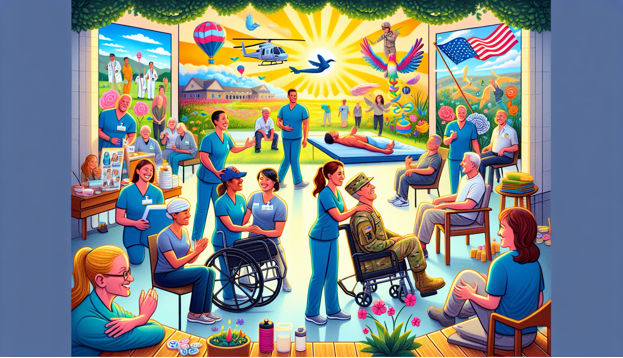
Beginning the recovery journey at a veterans rehab center is a courageous and essential step for many. These specialized programs are designed to address the unique needs of veterans, including issues like PTSD and substance use disorders. TriCareRehabs promises to walk with veterans every step of the way, offering the support and guidance needed to navigate the challenges of recovery.
Seeking help can be daunting, but it is the first and most crucial step in the recovery process. All calls to TriCareRehabs are confidential, ensuring that veterans can reach out for help without fear of judgment or stigma. The dedicated staff at these rehab centers is committed to providing the highest level of care and support, helping veterans build a foundation for lasting recovery.
Making the move to reach out for help allows veterans to start their journey towards a healthier, more fulfilling life. The support and resources available at veteran alcohol rehab centers are designed to empower veterans, providing them with the tools they need to achieve and maintain sobriety.
Reach Out to TriCareRehabs for Our Support Today
From medical detoxification and therapy sessions to dual diagnosis treatment and post-treatment support, the comprehensive programs available at veteran rehab centers are designed to address the specific needs of military veterans.
Accessibility and inclusivity are prioritized, ensuring that all veterans can receive the care they deserve.
Insurance coverage through the VA Community Care Network and other options like TRICARE for Life provides veterans with the means to access these vital services.
State-of-the-art facilities staffed by multidisciplinary teams of professionals offer a supportive and healing environment for veterans on their recovery journey.
The path to recovery is challenging, but with the right support and treatment, veterans can overcome addiction and build fulfilling lives. By recognizing and addressing the unique needs of veterans, we can contribute to their long-term success and well-being.
If you or a loved one is a veteran in need of help, please make the call to our caring experts at TriCareRehabs.com today.
FAQs on Veteran Rehab Centers and Getting Support
What are the unique challenges faced by veterans in addiction treatment?
Veterans encounter distinct challenges in addiction treatment, including elevated rates of substance use disorders, PTSD, and cultural norms regarding alcohol consumption. These factors necessitate tailored treatment programs to effectively address their unique needs.
What types of treatment programs are available for veterans?
Veterans have access to various treatment programs including medical detoxification, individual and group therapy sessions, and dual diagnosis treatment, all aimed at addressing addiction and mental health issues effectively. It is crucial for veterans to seek these tailored resources for their well-being.
Why is post-treatment support important for veterans?
Post-treatment support is essential for veterans as it aids in their transition to civilian life, promotes long-term sobriety, and fosters a stable routine through counseling and peer connections. Such support is vital in sustaining their recovery journey.
How do veteran rehab centers ensure accessibility and inclusivity?
Veteran rehab centers ensure accessibility and inclusivity by incorporating physically accessible designs and providing tailored support that addresses both addiction and mental health challenges faced by veterans. This approach fosters a supportive environment conducive to recovery.
What insurance options are available for veterans seeking addiction treatment?
Veterans have access to various insurance options for addiction treatment, including VA benefits, the VA Community Care Network, and TRICARE for Life. These options can significantly reduce the financial burden associated with rehabilitation services.
Contact Us
- Marine Corps Substance Abuse Program Guidance - December 8, 2025
- Does Spice Show Up on a Military Drug Test? - December 2, 2025
- Air Force DDRP Guidance - November 30, 2025